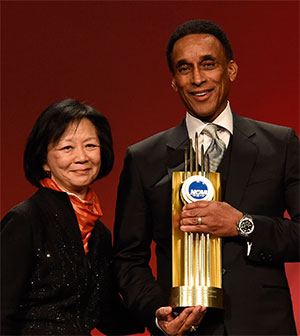
Mannie Jackson
The name of Mannie Jackson's autobiography, "From Boxcar to Boardrooms," is an appropriate way to describe the ascension of a true African-American pioneer in basketball and the business world.
Literally born in a railroad boxcar in Illmo, Missouri, Jackson was raised in his grandfather's adopted home state of Illinois, which, in many areas, was still heavily segregated. From a challenging start, Jackson rose to a corporate career that included seats on the board of directors of six different Fortune 500 companies and to the position of CEO of the Harlem Globetrotters from 1993-2007.
After earning all-state honors and leading Edwardsville High School to the state high school Sweet Sixteen as a junior and senior, Jackson was recruited to the University of Illinois, where, as a pioneer, became the first African-American letter winner and starter in the history of the program, alongside teammate and lifelong friend Govoner Vaughn. Jackson earned three letters from 1958-60, and was voted team captain as a senior. He played in 67 career games, starting and averaging in double figures all three seasons. Jackson averaged 11.1 points as a sophomore, 13.6 points as a junior and 16.4 points as a senior, earning All-Big Ten and honorable-mention All-America honors. He concluded his career in 1960 ranked fifth on the school's all-time scoring list with 922 points.
Jackson went on to play for the Harlem Globetrotters from 1962-64 before embarking on an incredible business career. After a several years at General Motors, Jackson joined Honeywell in 1986, and quickly rose to one of the company's highest executive positions. In 1986, he helped to found the Executive Leadership Council, which was a group of African-American corporate executives from various industries that would interact and build strong ties with one another. This is another example of his pioneer experiences.
In 1993, when the Harlem Globetrotters were nearly bankrupt, Jackson purchased them for $6 million, and began a remarkable turnaround of the storied franchise. Once again, proving to be a pioneer, Jackson became the first African-American owner of a major international sports and entertainment organization. In a short period of time, Jackson led the Globetrotters to record attendance and revenue growth, expanding the team's reach to more than 118 countries. He has served as a director of several companies, including Reebok International, Stanley Works, Jostens, United Entertainment Group and True North.
Jackson has been recognized throughout his career as one of the nation's 30 most powerful and influential black corporate executives, one of the nation's top 50 corporate strategists and one of the 20 African-American high-net-worth entrepreneurs.
Jackson is known for his commitment to community. Under his leadership, the Globetrotters charitable contributions totaled well over $15 million. He personally has donated generously to a number of causes, including the American Red Cross, victims of Hurricanes Katrina and Rita, the Globetrotters Scholarship Foundation, South African youth funds, the Basketball Hall of Fame and the Lincoln School Alumni Foundation of his hometown Edwardsville, Illinois.
The Basketball Hall of Fame's Mannie Jackson Human Spirit Award honors him and is given annually to an individual who embraces the core values of hard work, striving to improve and commitment to others. He has served on the board of governors for the American Red Cross, and as vice chairman and chairman of the Basketball Hall of Fame, the first African-American to hold those positions.
Jackson was also among 12 distinguished nominees for the Archbishop Desmond Tutu Award for Human Rights in recognition of his work in South Africa. He is a founding member and former president of The Executive Leadership Council, providing African-American executives with a network and leadership forum. He has also been a board member of the Community for Education Foundation of New York. In January, 2015, Jackson was honored by the NCAA with the Theodore Roosevelt Award, the association's highest recognition for an individual.